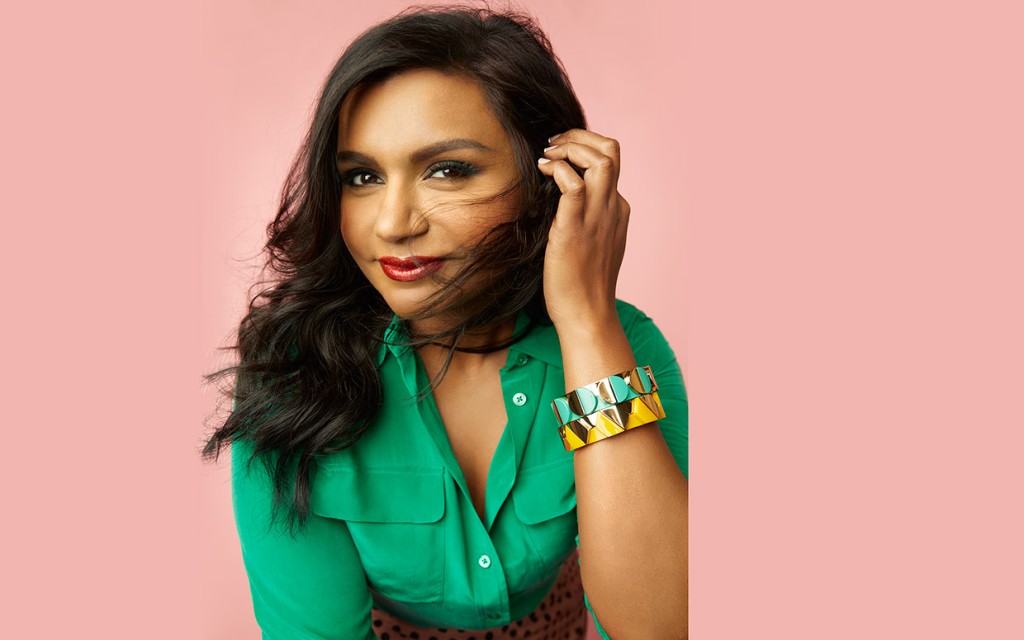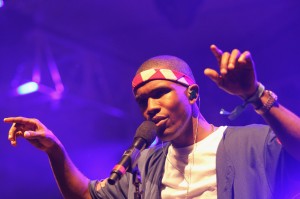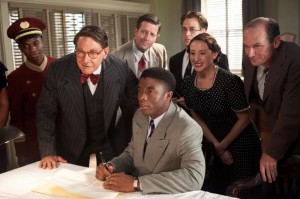
In a recent interview with Parade magazine, Mindy Kaling was quoted as saying the following:
“There are little Indian girls out there who look up to me, and I never want to belittle the honor of being an inspiration to them,” she says. “But while I’m talking about why I’m so different, white male show runners get to talk about their art.”
The following is a real-time, semi-edited chat conversation between myself and The Aerogram’s contributor G.B. discussing Kaling’s comment.
G.B. I think that’s kind of a bullshit statement from her. I understand she’s frustrated, but them’s the breaks of being a trailblazer. Deal with it.
K.V. Really? I thought the opposite.
G.B. Listen, I understand it’s frustrating, but it comes with the territory of being one of the first. You take on a certain added responsibility whether you like it or not.
K.V. I mean, she said she doesn’t want to belittle the honor of it.
G.B. Still, you can tell there’s frustration behind it.
K.V. Because that’s probably all she’s asked. And then again, people are still criticizing her for not being inclusive enough on her show.
G.B. What do you mean?
K.V. I feel like she’s held to a higher standard because she’s a person of color. For example, some people think that The Mindy Project should have a more “diverse” cast and be overall more sensitive. I get the feeling she gets hounded for that kind of little stuff in her interviews.
G.B. Someone on The Aerogram made a good point that she’s kind of starting from a disadvantage, and she has to do whatever she can do to get viewers. That’s how she can best service the goal of being a successful person of color. The unfortunate truth is if she had all brown people, less people would watch.
K.V. True. But I mean, I don’t think it’s like she’s not embracing being on that platform and being a role model. It’s just — maybe that’s all some people want to talk about. And she’s more than just some quota filler. I don’t know. I kind of empathized.
G.B. First, the fact that she’s “The first brown whatever, whatever” is getting her added exposure. So, the disadvantage to that is you’ll be asked about it. Second, it shouldn’t come as a surprise.
K.V. It’s not a surprise. It’s just that — nobody is going around asking Seth Rogen about how it felt writing This is The End as a white man.
G.B. Because there’s been a million before him.
K.V. But they talk about the product and they judge him on the product
G.B. She talks about the product a lot. I feel like people are judging her on the product
K.V. I guess she just wants to talk about the product more.

G.B. Then talk about the product. No one’s stopping her. But understand that because she’s “the first,” she has an added responsibility and she knew that going in. Remember when Frank Ocean came out? Some people said, “Oh that’s great, but wake me up when it’s not a big deal anymore. That’s when we know we’ve made progress.” Unfortunately, we have a LONG way to go before it’s not a big deal. But Frank Ocean was the first step towards that.
K.V. She was born in Massachusetts. She’s as WASP-y as they come. Except for the Hindu part, she’s as privileged as they come — she went to Dartmouth, the child of professionals. She probably said everything she wanted to say on the “Diversity Day” episode of The Office (which Kaling co-wrote).

Photo Credit: Warner Bros.
G.B. But that’s the thing, if she wasn’t as WASP-y as they come, she probably wouldn’t have been given this opportunity. In the movie 42, there was a scene where Branch Rickey (the owner of the Dodgers) had to find “the right kind of black guy” to be the first African-American baseball player – someone who would be accessible and the least offensive to the white public. But, again, that’s the territory that comes with being the first.
K.V. Right. If anything, she’s the anti-role model. Her character does everything good desi parents don’t want their kids doing. I guess that could be trailblazing.
G.B. She’s trailblazing in a lot of ways. And yes, it sucks that she has to talk about it. But she’s getting a hell of a lot more exposure because of it.
K.V. Not on her talent alone? And her writing?
G.B. Without those talking points, people would ask her less questions, not ask her more about the show.
K.V. I like to think if she were a young, white woman, she would get the same amount of attention. She’s the brown Lena Dunham, but more palatable.
G.B. Say she’s being asked 10 questions and five are about being a brown woman and five are about the show. If she were a white guy, she would probably only be asked just five questions, not 10 questions about the show. It’s more stuff out there about her. There are hundreds of shows out there competing for talking points and exposure time. Her being the first to do a bunch of this stuff gives her an added talking point over those 995 other shows produced by white men.
K.V. Initially, my thought was “Go Mindy — you tell ’em.” In my mind, she’s super privileged — as model minority as they get and I’m not losing sleep worrying about her in the slightest. But I understand the defensiveness. It’s the same as someone coming up to me and saying, “You got into law school because you’re a minority.” And then I have to say, “No, I got into law school because I graduated magna cum laude and was the graduation speaker of my class.” And then they’re all like, “Well that extra cultural heritage was a plus point that got you in and I didn’t because I’m a white guy.”
G.B. I don’t think anyone ever said she got that show because she’s a minority. I think everyone realizes she’s talented. But let’s be honest, New Girl is the more successful, more polished show. You don’t get all these articles on Zooey Deschanel or whoever the showrunner is behind that show. And whoever says that to you is just ignorant.
K.V. True, that.
Kishwer Vikaas is a co-founder and editor of The Aerogram. Find her on Twitter at @Phillygrrl or email her at editors@theaerogram.com. Follow The Aerogram on Twitter @theaerogram.
G.B. doesn’t stand for Gareth Bale. It might stand for Graduated, Barely (from law school). After spending time in Texas and Pennsylvania, he now lives in Northern California where he makes gifs and watches a lot of TV, movies and sports.













Interesting discussion – thanks for putting it up.
You both make good points on what is surely one of the most hotly-debated topics related to minorities as trailblazers. I don’t know that I agree with all of them, but there are enough gray areas here that I am not able to clearly take a side.
I recently listened to a discussion with Jhumpa Lahiri on the BBC World Book Club Service. And, a reader had posed a similar question to her – something about how she feels about representing the Indian-American immigrant in literature. And, she back-pedaled very quickly too – that she could not take on the responsibility of trying to represent an entire culture or community. Her writing, while it focuses on characters who are Indian-American immigrants, is not necessarily just about that. They are individuals and, as such, a lot of what they experience is something that can be experienced by other minority groups or, even, non-minorities in certain circumstances. I’m paraphrasing all this, by the way.
So, that begs another question. I absolutely agree that people in the spotlight like Kaling or Lahiri or whomever, should be presented as role models to the next generation of Indian-Americans. That said, do those role models have to carry the flag 24/7? I think not. Lahiri is right – can 1 artist or leader really speak to an entire culture or generation? Do we really want them to? Isn’t that a slippery slope towards stereotyping and generalizations if we do?
I do agree with the point re. the 10 vs 5 questions because Kaling happens to be a minority artist. Which is a real shame. Because, if anything, that’s off-putting to the next generation, I imagine. Would you want to invest the sort of physical and emotional energy into trying to make it as an artist if you knew that, more than half the time, your art is not going to be center-stage, but your cultural and racial identity is? Off-putting, I’d think.
I thought about this a little bit more, and what I want to make sure is clear, from at least my side of it, is these are problems that more than likely is going to be unique to Kaling’s experience. I doubt whoever is “next” will have quite the same experience as she did. After all, rarely does anyone remember who was second, right?
Another thing – which, I’m not sure how relevant this is – is that the mere fact that Kaling did it, as in produced and starred in a show as an Indian-American woman, and whether or not the show is successful or even good for that matter are almost two completely different discussions. So, in the 10 vs. 5 discussion, you can look at it as 5 questions about being who she is in the position she is and 5 questions about the show. The fact that the show has enjoyed some measure of success almost just lends credibility to the fact that she’s doing what she’s doing as a woman of color.
But Kaling is “opening the door” so to speak. And as other people who share in the same cultural background come to the forefrong, she won’t have to carry the flag 24/7. Again, them’s the breaks of being the first one there, unfortunately.
Yeah, I agree with you that the next person to follow in Kaling’s footsteps will likely not experience the same challenge (her challenge will likely be how to measure up to or better Kaling’s track record as comparisons are likely to abound).
I don’t know if I agree entirely with the second bit – that Kaling’s efforts as an Indian-American and her the quality of her product (the show) are mutually exclusive issues. I think they are entirely intertwined exactly because she’s opening the door.
This reminds me of an interview on NPR with Rita Moreno just a few days ago. What she said applies just as much to Indian-Americans as it does to Latinos. She articulated it so well, I’m going to copy and paste here:
“I’m quoting Ricardo Montalban, who really said it best a number of years ago, but it’s still — it’s still apt.
He said, the door is ajar, and it’s a big, heavy door, too. So, if you’re going to look for opportunities, you’re going to have to have some strength to push that more open. It’s certainly better, and it’s wonderful to see more Hispanic names on the professional scene, from my end, in show business.
But I’m still waiting to see an actor or actress of Hispanic descent being offered a role that is worthy perhaps of an Oscar nomination. I have talked to a lot of young people, and I always do. It’s a part of my modus vivendi. And the one thing they always ask is, well, why are you the only one?
And I really don’t think it’s that complicated. I think it is because I don’t think the — our people, our actors haven’t yet gotten something that’s really very, very strong and meaningful.”
So, I’ll quote Moreno now: Till we see an actor or actress of Indian-American descent offered a role that is worthy perhaps of an Emmy or Oscar nomination, this debate will continue.
Don’t you think?
Maybe saying this is verboten on this website, but I think “New Girl” is terrible and, as shaky as “The Mindy Project” is, I find the latter the much better show. I watched the pilot episode of “New Girl” twice (I was on a plane), and it was just one awful thing after another, winding up with the guys singing the Dirty Dancing song to her to rescue her from being stood up. Barf.
I put “New Girl” in a category with “Twilight” as the kind of thing I’ll never get, even if I see where it’s technically competent and audience-pleasing, because I object so strongly to the values and worldview underlying it.
In contrast, “The Mindy Project” is kind of all over the place, but it has a genuinely endearing/ flawed main character, unlike the “adorkable” BS we get fed with Jess. I personally would love to see my specific obsessions with topics like health care in America get more airtime (the first episode gave me so much hope with Mindy struggling over whether to accept an uninsured patient!), but at least they’re a little bit present.
I have enough friends who like “New Girl” that I gave it another try with the episodes “Kryptonite,” “Thanksgiving” and “Fancyman,” and they were less awful than the pilot but still didn’t give me any desire to know what happens next for these people because I have no reason to care about them, and the show is about nothing but them — it doesn’t seem to have any interests other than “when will X and Y get together/ break up?”
/hateration